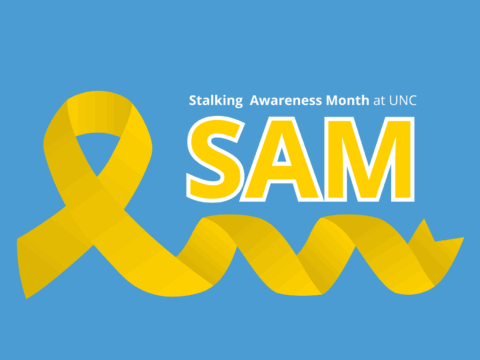
Recognized in January
January marks Stalking Awareness Month (SAM), a time recognized nationally and by UNC to raise awareness, promote prevention, and highlight the resources available at Carolina for members of our community impacted by stalking.
UNC defines stalking as, “when an individual engages in a course of conduct directed at a specific person under circumstances that would cause a reasonable person in similar circumstances and with similar identities to fear for the person’s safety or the safety of others or to experience Substantial Emotional Distress.”
Stalking can take many forms. It may involve individuals who are known to one another or who have a current or previous relationship, or may involve individuals who are strangers. Stalking involves two or more acts, and may occur through direct or indirect contact, including through other people. It may be carried out through any action, method, device, or means to follow, monitor, observe, surveil, threaten, or communicate to or about another person.
Stalking behaviors can occur in person or through digital channels including phone calls, email, social media, and other online platforms.
Stalking behaviors can include:
- Sending repeated, unwanted calls, texts, emails, letters, and/or social media messages
- Creating fake social media accounts or profiles to communicate, monitor, and/or impersonate
- Using multiple social media platforms to engage in unwanted contact, monitoring, information gathering, and/or communication
- Repeatedly showing up at someone’s home, workplace, class, or social gathering space
- Leaving unwanted gifts or letters
- Damaging property
- Using technology or other methods to track or monitor someone’s location
Healthy relationships require all parties to communicate, recognize, and respect boundaries. This includes recognizing when communication is unwanted or not reciprocated. For example, blocking someone on one social media platform is not an invitation to access that person on a different platform. If you are unsure whether your communication is welcomed, you should ask. Be sure to respect the response, especially if it is not the answer you hoped to receive.

